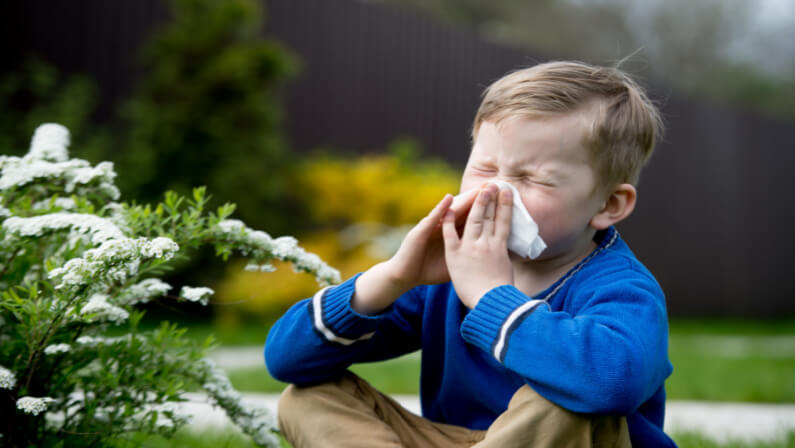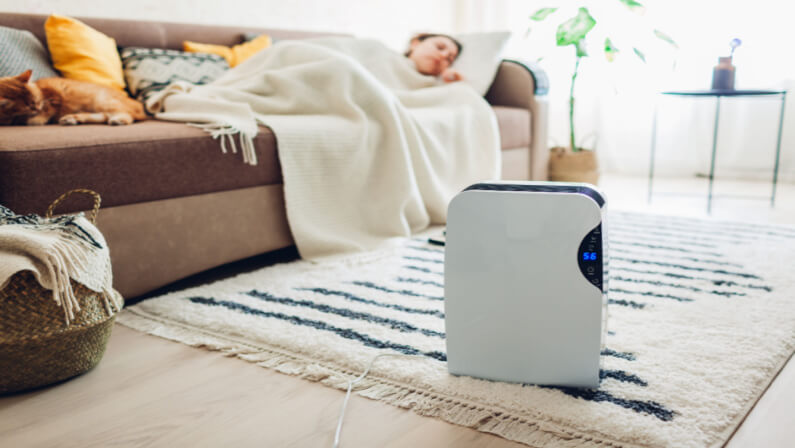Hay fever can last for weeks, even months. A considerable amount of people are suffering from hay fever. It’s an allergy and therefore not contagious. Hay fever tends to worsen when there’s warm, humid, windy weather.
What is hay fever?
Hay fever, commonly known as allergic rhinitis, results in symptoms similar to a cold. But hay fever isn’t brought on by a virus like a cold is. Instead, an allergic reaction to an ordinary indoor or outdoor chemical that the body misinterprets as dangerous causes hay fever (allergen).
When do people usually get hay fever?
When the body’s immune system detects an allergen, it triggers hay fever. These allergens are mostly something in the environment that generally doesn’t harm most individuals. However, some bodies overreact to them.
- Seasonal: Spring, summer, and the beginning of fall can bring seasonal allergic rhinitis symptoms. They are typically brought on by an allergic reaction to mold spores in the air, tree, grass, and weed pollen.
- Perennial: Individuals who suffer from year-round allergic rhinitis have this condition. In most cases, mold, cockroaches, pet hair, or dander are blamed. Rarely do underlie or concealed food allergies result in persistent nasal problems.
Is hay fever contagious?

Hay fever is not contagious. However, allergies run in families. If a parent or other family member suffers from allergies, your chances of developing hay fever increase. Hay fever is also more common in those with eczema or asthma.
Hay fever symptoms
The symptoms of hay fever include:
- A stuffy nose and a runny nose (congestion)
- Red, itchy, and watery eyes (allergic conjunctivitis)
- The skin beneath the eyes seems swollen and bruised (allergic shiners)
- Sneezing
- Cough
- Itchy throat, nose, or roof of the mouth
- Throat mucus that drips down the back (postnasal drip)
- Extreme exhaustion, frequently brought on by a lack of sleep
What causes hay fever
Allergens cause hay fever. These allergens do not harm most people. In contrast, hay fever causes your immune system to believe that the allergen is invading.
As a result, the immune system sends organic substances into your bloodstream, histamine being the primary chemical, to defend your body. As they attempt to expel the allergen, the mucous membranes in the nose, eyes, and throat swell up and become irritating.
Hay fever triggers include:
- Outdoor allergens, such as weed, grass, and tree pollens, as well as mold spores
- Allergens in the home, such as dust mites, mold, and pet hair or dander
- Non-allergic irritants like cigarettes or other smoke, perfumes, cleaning supplies, and other potent odors can also trigger rhinitis.

How is hay fever diagnosed?
To diagnose hay fever, the doctor will normally conduct a physical exam. One or both of these tests may also be advised by the doctor:
Allergy Blood Test
A blood sample is forwarded to a laboratory to determine how the immune system reacts to a particular allergen. This test counts the number of immunoglobulin antibodies, which are the allergy-causing antibodies in your bloodstream.
Skin Prick Test
This procedure is done by puncturing tiny particles of a substance that may cause allergies in patches of the skin on the arm or upper back. After that, the patient will be monitored for any allergic reaction. If there’s an allergy, a raised bump appears at the allergen’s location. Normally, this takes 15 to 20 minutes.
How to treat hay fever
Living with hay fever can be hard, but many allergy drugs can reduce symptoms and make it bearable. These medications can be taken as liquids, pills, eye drops, nasal sprays, or injections, among other delivery methods.
Antihistamines

One of the most widely used medications is Antihistamines.
Antihistamines have a limited impact on congestion, although they can aid with itchiness, sneezing, and runny nose.
Antihistamines can come in different forms, like pills, nasal sprays, and eye drops. Typically, these medications are administered as pills (orally).
Decongestants
The effectiveness of decongestants is only limited to reducing nasal stuffiness and pressure from swelling. Therefore they are sometimes combined with other medications, such as antihistamines, to address other symptoms.
Corticosteroid nasal sprays
A nasal corticosteroid spray helps to make breathing through the nose easier by reducing the swelling and mucus in the nasal passageway.
Leukotriene inhibitors
Leukotrienes are substances the immune system produces that aggravate allergy symptoms like runny nose and excessive mucus production.
To block the action of leukotrienes, Montelukast (Singulair), a prescription tablet should be taken. It is frequently utilized when nasal sprays cannot be tolerated or for mild asthma.
Immunotherapy
When the previously mentioned medications no longer help reduce hay fever symptoms or are causing many adverse effects, doctors recommend allergy shots, often known as immunotherapy.
It alters how the immune system responds to allergens. One will receive repeated doses (injections) with minute levels of allergens for 3 to 5 years. The objective is to acclimate the body to the allergens that are the source of the symptoms and lessen the need for medication.
Home remedies for hay fever
Home remedies are more on measures that can be taken at home to avoid triggering the allergy.
Here are tips on how to do that:
- Use an air conditioner rather than opening your windows if you suffer from seasonal or pollen allergies.
- Use a dehumidifier or a high-efficiency particulate air (HEPA) filter.
- Wash blankets and linens in hot water above 130°F (54.4°C) if experiencing a dust mite allergy.
- Vacuum your house once a week and add a HEPA filter to it.
- Reduce the amount of carpet in your home if you can.
However, if the symptoms are worsening and cannot be remedied at home or medications no longer work, proceed to the nearest, most reliable urgent care in Kingwood, Tx like Aether Health – Kingwood ER.

Hay Fever Risk factors
The following factors can increase the risk of getting hay fever:
- Genetic factors. Having an allergic or asthmatic blood relative, such as a parent or sibling.
- Other allergies or asthma. Having asthma and allergies like eczema increases the risk of developing hay fever.
- Gender and age. Boys are more prone to hay fever before puberty, while girls are more impacted after puberty.
- Birth date. The probability of acquiring hay fever is seen among people born during the high pollen season.
- Second-hand smoke. Early-life cigarette smoke exposure raises the likelihood of developing hay fever.
How to prevent hay fever
To prevent hay fever, it is best to avoid exposure to factors that trigger allergy. Take the necessary precautions, like taking a shower immediately after going outside and staying indoors during spring, summer, and the beginning of fall.
When more help is needed
Seek immediate care when the hay fever symptoms get worse and out of hand. Residents living in Kingwood, Texas, should immediately proceed to Aether Health – Kingwood ER. For others who live outside the area, visit the nearest one accessible.




